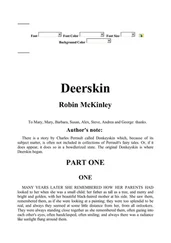Robin McKinley - Water
Здесь есть возможность читать онлайн «Robin McKinley - Water» весь текст электронной книги совершенно бесплатно (целиком полную версию без сокращений). В некоторых случаях можно слушать аудио, скачать через торрент в формате fb2 и присутствует краткое содержание. Год выпуска: 2002, ISBN: 2002, Издательство: Firebird, Жанр: Старинная литература, на английском языке. Описание произведения, (предисловие) а так же отзывы посетителей доступны на портале библиотеки ЛибКат.
- Название:Water
- Автор:
- Издательство:Firebird
- Жанр:
- Год:2002
- ISBN:9780142402443
- Рейтинг книги:4 / 5. Голосов: 1
-
Избранное:Добавить в избранное
- Отзывы:
-
Ваша оценка:
- 80
- 1
- 2
- 3
- 4
- 5
Water: краткое содержание, описание и аннотация
Предлагаем к чтению аннотацию, описание, краткое содержание или предисловие (зависит от того, что написал сам автор книги «Water»). Если вы не нашли необходимую информацию о книге — напишите в комментариях, мы постараемся отыскать её.
Water — читать онлайн бесплатно полную книгу (весь текст) целиком
Ниже представлен текст книги, разбитый по страницам. Система сохранения места последней прочитанной страницы, позволяет с удобством читать онлайн бесплатно книгу «Water», без необходимости каждый раз заново искать на чём Вы остановились. Поставьте закладку, и сможете в любой момент перейти на страницу, на которой закончили чтение.
Интервал:
Закладка:
After a little while, the Guardian said thoughtfully, “This island is a strange place; I believe there is no other place like it in all the wide world, though there must be other places just as strange. It is our strangeness to be a threshold between land and water; and the boundary between us is striven for, and fought over, and it shifts sometimes this way, and sometimes that. Perhaps there are Guardians on the other side of the boundary, as we are the Guardians of this; perhaps it is only on account of our angle of vision that it seems to us that the forces of water desire to overwhelm us. Perhaps whatever lives in the deep of the water does not understand that if it succeeded in bringing the dry lands under its sway, it would kill a great many people and plants and animals who love their lives, for I assume plants and animals love their lives too; perhaps it does understand, and does not care, for we are mere land-dwellers. I do not know. But I do know that it is over this one island that the war is fought, and if once we yielded, then all those lands behind us—farther from the boundary we protect—would immediately come under threat; and they have no Guardians. We are the Guardians, and here we hold the line.”
Tamia listened to her Guardian, because she always did; but she was still in thrall to the great beauty of the ocean, and did not understand. It was not until half way through her second year as the Guardian’s apprentice that she saw her first great storm.
There were dangerous storms every winter, storms where people and animals might be lost, if they were unlucky. But she had only seen one or two storms as great as this one when she lived in the valley, storms that uprooted trees and drowned sheep in the fields, that levelled houses, and might occasionally do the same to whole villages. “Island weather,” everyone called it, and the old people nodded sardonically after it was all over and the losses were never as great as first they appeared, and said to people like Tamia’s stepfather, “Are you so sure the Guardians do not earn their tokens?”
But she could not have guessed how much wilder and more fearful such a storm would be near the crest of the Eagle, and, as a Guardian’s apprentice, what it would be like to be one of the people trying to help throw back the deluge that threatened to drown their land like a fishing-boat in a sudden squall. She knew about rain and wind, about the prying fingers of storm under the eaves, the whiplash of sleet and the terrifying lift of a strong wind, if you were so unfortunate as to be caught outdoors in it; she did not know, when she lived in the valley, about the high mad voices in it, and the faces that almost shaped themselves from the roiling mists, nor the clinging of wetness that looked like rain, and first ran down your body like rain, but then seemed to wrap itself about you like a bolt of heavy cloth, and pull you under.
She did not know that the stones in their own water-garden would hide in the cloud- and fog-shadows scudding across on the pool’s surface, would elude them by the rain in their eyes and the pounding of the wind against their bodies, by the sudden inexplicable water-spouts in the garden itself, which created deep scoured trenches in the sandy floor of the pool, where the stones they had so painstakingly placed then rolled and tumbled. She did not know that the flakes of gold that lay in the sand or floated in the water would become sharp as flints, and cut at her, that the golden pebbles would become dazzling, dizzying, vertiginous, that the rainbows that often hung round the water-garden would turn a muddy, treacherous brown, and twist around her, hampering her, tangible as vines. Tamia knelt and crawled at her Guardian’s side, straining to hear her Guardian’s shouted words through the shriek of the wind, knowing without being told that the water was being called to rebel, to rise up in mastery and dominion over the land, and that while the stones in their own garden dodged away from them, shifted in their places and slid into unexpected holes, that the water was winning.
Several hours they waded and crept and floundered through the water-garden, the gritty stones slipping through Tamia’s cold fingers, her forearms and forehead sore from sand rubbing against skin when she tried, uselessly, again and again, to wipe the wet from her eyes, while she expected at any moment to discover that she had become the tiny gap in the wall through which the conquering water would at first seep, and then trickle, and then blast and roar.
But storms like these were very rare. And Tamia, who had nightmares for months after this one, was glad of it; because for the first time since she had made her first magic in the water-garden, she wondered again if perhaps her Guardian had made a mistake about her after all, that she was not strong enough to be a Guardian. But there were no more savage storms, and Tamia’s other lessons went well, for she was not, as her Guardian had said on their first meeting, afraid of hard work.
The second year passed more quickly than the first, and the third quicker yet. She saw Southern Gate again, and Four Doors several times—“Four Doors is always a wanderer, whoever it is; the Four Doors when I was an apprentice was just the same, and my Guardian told me that the two she could remember before that one were wanderers too”—and White North once took Tamia away for three days, on one of those Guardians’ walks through the villages of more ordinary folk. “I should take you myself,” said Tamia’s Guardian, “but I told you I’d grown too old for mountain-climbing. White North will look after you. You should see the people you guard occasionally, and remind yourself of what their lives are like, especially when you’re still young and unused to this work; it makes what we do here more real.” Tamia hadn’t liked being away from her Guardian—and had not enjoyed the looks on the faces of the villagers they met—but White North was a pleasant travelling companion, and her Guardian was right, the experience had made her feel for the water-garden much keener. She had gone walking once more, this time with Four Doors, early in her fourth year as apprentice.
But some time during that fourth year Tamia began to notice, although she fought against noticing, that her Guardian was slowing down. She went to bed earlier in the evenings, and while she rose as early as she had when Tamia first came, it seemed to take her longer to wake up, and Tamia took over more of the ordinary checks and guards and sightings and alignings of the Guardian’s tasks, and she bid the old yew good-day and good-evening, and when she went for walks—or rather, when she was sent on them, for she would not voluntarily leave her Guardian alone—she went by herself. But when the Guardian spoke, she was the same Guardian she had always been, and so Tamia tried to ignore the rest.
Soon after the beginning of Tamia’s fifth year as apprentice, her Guardian fell ill.
Tamia found her, one afternoon, returning from gathering mushrooms on the gentle slopes of the Dove, slumped by the water-garden. She had fallen into the edge of the pond, and the first, horrifying thing Tamia noticed was that she had fallen with her cheek propped against one of the stones Tamia had placed during the first magic she had ever done by herself; and because of this, her Guardian’s nose and mouth had been held just clear of the surface of the water.
Tamia did not allow herself to think about this for long. Her Guardian’s face was a strange, chalky-grey colour, her breath rasped, and her body lay in a twisted huddle. Furthermore, the wind down the mountain was cold today, and her left side lay in the pond. Tamia had dropped her basket halfway across the meadow, and had run to her Guardian; but even when she raised her head and shoulders onto her own lap, she could not waken her; and the sound of her breathing was dreadful.
Читать дальшеИнтервал:
Закладка:
Похожие книги на «Water»
Представляем Вашему вниманию похожие книги на «Water» списком для выбора. Мы отобрали схожую по названию и смыслу литературу в надежде предоставить читателям больше вариантов отыскать новые, интересные, ещё непрочитанные произведения.
Обсуждение, отзывы о книге «Water» и просто собственные мнения читателей. Оставьте ваши комментарии, напишите, что Вы думаете о произведении, его смысле или главных героях. Укажите что конкретно понравилось, а что нет, и почему Вы так считаете.












